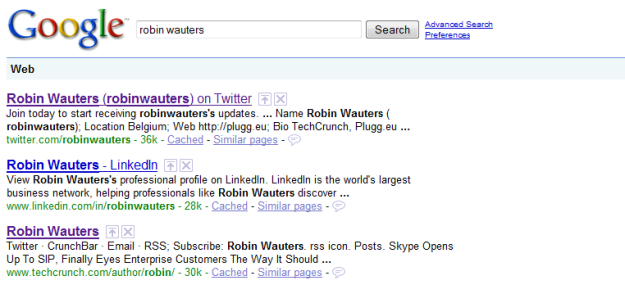
Notice that title tag for my Twitter profile page?
It reads “Robin Wauters (robinwauters) on Twitter” where it used to say “Twitter / robinwauters”. For the TechCrunch Twitter account, it used to read “Twitter / TechCrunch” (only the username) instead of now “Michael Arrington (TechCrunch) on Twitter” (full name + username).
Minor tweak, you say? Mundane change? Perhaps, but with an undeniably big impact on how high Twitter pages will be ranked in search engines from now on.
Still skeptical? Do a Google search for your name, or try mine. For the longest time, my LinkedIn profile and now defunct blog about internet marketing used to show up as the first results, battling with other social networking profiles and websites. Today, it shows my public Twitter profile page as the number one result. The first thing anyone will click on when they do a search on my name. That’s huge.

I tested a few users who’ve had a public profile for more than two years, and the results are telling: nearly all of them have their Twitter profile linked in the top 5 results when performing a Google search. Try it out yourself to see how high yours is ranked.
We’re not sure when exactly Twitter tweaked the way it presents title tags, but when searching Google the old representation can currently still be found in the search results (i.e. you can still see Twitter / TechCrunch when you do a search for “Michael Arrington”), so we’re assuming this is shiny new.
Update: changes were made yesterday according to co-founder Biz Stone.
The implications are not to be underestimated. Being the top result for a name search means business, just ask all those venture-backed startups building people search engines who are vying for the sweet spots on the first page. Consider the fact that Facebook is changing its profile URLs to better carry a person’s name for their profiles. Think about simple services like MeeID or UnHub who were on their way up the search results for full names of people who registered their personal profiles there. For most users with a public stream, Twitter is trumping them.
If Twitter can dominate the number one spot for queries on people who have a public profile on the social micro-sharing service, that is one more entry point into Twitter which should help it continue to grow visitor traffic exponentially. Furthermore, more new users might be enticed to sign up to try out the service themselves because their friends or relatives are apparently using it too. Conveniently, this is all popping up at a time when the startup’s business model is becoming more and more apparent, its momentum is going through the roof and much larger companies are turning their heads to see what all that noise is about.
Anyone still think Twitter is peaking, or even headed for the deadpool?